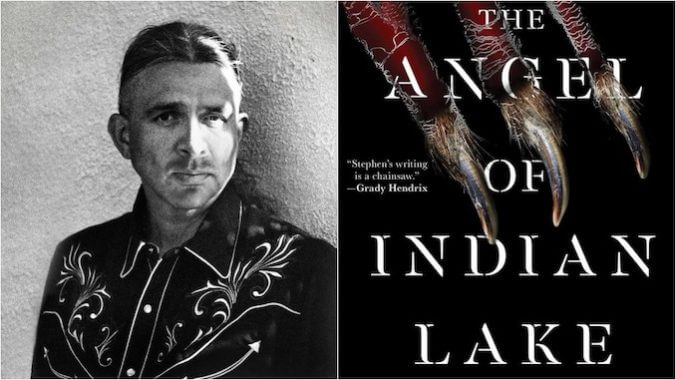Stephen Graham Jones on The Angel of Indian Lake, Slasher Tropes, and Saying Goodbye to Jade Daniels

Stephen Graham Jones knows slasher stories. He’s proven it time and again in novels like Demon Theory, The Last Final Girl, The Only Good Indians and, of course, the first two books that make up his Indian Lake Trilogy, 2021’s My Heart is a Chainsaw and 2023’s Don’t Fear the Reaper.
Now, with The Angel of Indian Lake, Jones is bringing that trilogy, and the story of his heroine Jennifer “Jade” Daniels, to a much-anticipate close, and he’s well aware of the expectations slasher fans have for this book. Over the past several days, readers everywhere have devoured Angel and its breakneck-paced story of bloodshed, redemption, and a Final Girl staring down the weight of her town’s history, but what was the story like from the inside? How did Jones grapple with expectations, tropes, and most importantly, the emotional honesty of his heroine’s journey, for one last bloody showdown?
Shortly before Angel‘s release, we got the chance to chat with Jones about how the novel came together, how that ending took shape, his next slasher journey, and of course, saying goodbye to an iconic character.


This interview has been edited and condensed for length and clarity.
Paste Magazine: The Angel of Indian Lake is almost entirely narrated by Jade Daniels. After two books, what made you think it was time to spend most of the story in her head?
Stephen Graham Jones: Well, you know the first one is third person of course, but it’s really tight on Jade. I think when people remember My Heart is a Chainsaw, they always say Jade is a narrator, and that’s always weird to me because she’s like our narrative focus, but she’s not actually the one speaking except for in her “Slasher 101” essays. Then when I figured out I was going to do a sequel and then a trilogy, I realized I’ve got to modulate the delivery throughout these three books.
So what I landed on for doing that was in the second one, it’s going to shatter and splinter into a multivocal thing with a lot of people speaking in Reaper, and a lot of people’s angles. To me, that was kind of set up for missing Jade. Like “This is fun, but I wish we had Jade.” So then in the third one, if I were able to, instead of only letting her speak during the [essays], if the main part of the narrative became her voice, then I was hoping that could feel like a return a little bit. Or it could just be as simple as I knew I was having to say goodbye to Jade and I wanted to hang out with her more. And how better to hang out with her than first person?
Paste: How did it change, just on a sentence-by-sentence level, the way you wrote this book?
Jones: When I peel the lid off the can that is Jade, she just talks and talks. It’s not hard to render her voice, to do her voice. But what was a little tricky was there were some pieces in the Baker Solutions reports [narrative interludes told from the perspective of someone investigating Jade] where we’re hearing Jade on the page as opposed to kind of in her head. So those were a little tricky, because I had to somehow find a middle ground between how she speaks when she’s 25 and how she speaks now…kind of intermingling with the Slasher 101 voice.
-

-

-

-

-

-

-

-

-

-

-

-

-

-

-

-

-

-

-

-

-

-

-

-

-

-

-

-

-

-

-

-

-

-

-

-

-

-

-

-








































